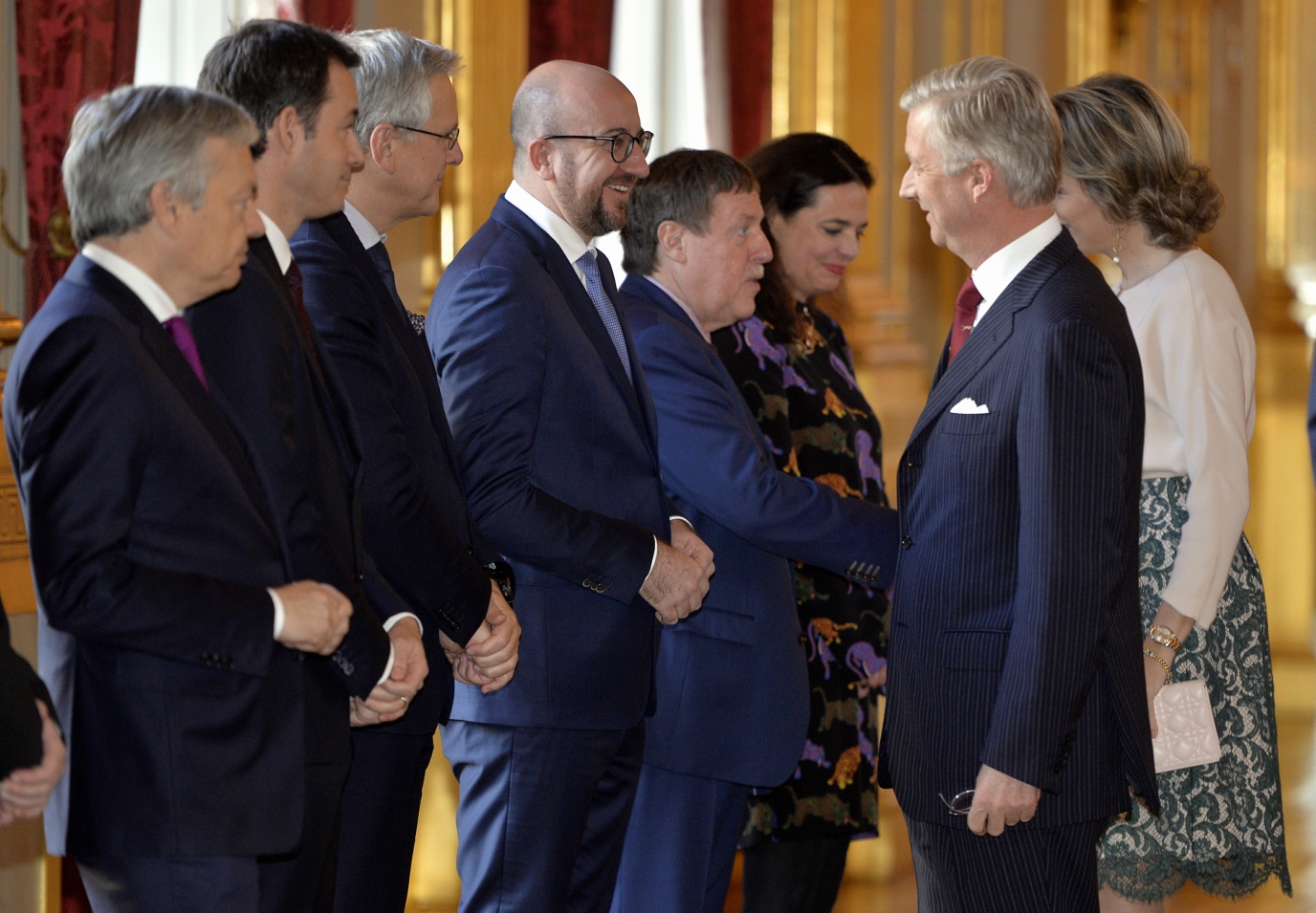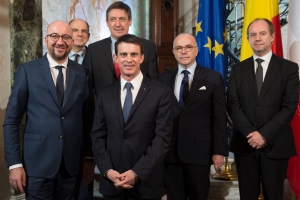Wishes to Governments of the Country
 ©Belga
©BelgaYour Majesty,
Dear colleagues,
Ladies and gentlemen,
On behalf of the government I would like to give you our best wishes for success and happiness in this new year, 2016.
First of all, let me wish you all the best for 2016 on behalf of the government.
This tradition provides us with an opportunity to look back and to look ahead.
What are the challenges facing us?
And what have been the experiences of the past year?
2015 has been a complex year.
There have been moments of tragedy. And unfortunately, also plenty of moments of sadness.
- Terrorism showed its true face. Killings occurred close to home. They were cowardly attacks perpetrated by young men who grew up here.
- The situation in Greece also put pressure on the European project.
- And via the Mediterranean, hundreds of thousands of refugees flooded into Europe. The largest influx since World War II.
2015 was therefore a year full of major challenges.
But the year also presented many opportunities.
Our people put on a grand display of dignity when faced with the Level 4 Terror Threat and the influx of refugees.
Another source of joy is seeing how the political world has set aside its political differences, to defend our fundamental values.
The work of our intelligence and security services, our justice system, our police forces and soldiers in the field deserves all praise. They take care of our security every day. I would like to thank them for this on behalf of everyone.
The dedication of our people during the refugee crisis is another example.
We have given refugees a dignified welcome. Without violence and with respect for our democratic values.
Equality between men and women is not a topic of discussion in our country.
And we will never allow women to be harassed because they are women. Regardless of whether they are refugees or not.
We cannot accept any exceptions when it comes to fundamental rights and liberties.
I am shocked by what transpired in Germany on New Year’s Eve.
It’s very clear to us: people who abuse our hospitality cannot enjoy protection here.
All refugees have the duty to accept our democratic values. And we also have the duty not to make generalisations.
We can therefore be rightly proud of the openness and tolerance of our people. We have provided a dignified welcome to the refugees. But we have not been naïve either.
We have therefore carried out a humane and firm policy. And we will continue to defend this policy.
(The power of crises)
Your Majesty,
Ladies and Gentlemen,
2015 was a complex year, but it also offered plenty of opportunities. Moving away from the deadlock. And going towards solutions.
I have full faith. And this faith is also based on the many positive signals we are receiving.
Also from abroad, from investors and international organisations. Our economy is growing and this is good news for everyone.
It was also a year of a lively democratic debate. With differences of opinion, of course … but mostly lots of decisions.
The Parliament and Government played their roles. I would like to thank everyone for this. No-one will deny that we have had passionate debates. Between the majority government and the opposition and sometimes also within the majority …
A passionate debate is a testament to the vitality of our democracy … and obviously to the freedom of the press.
2015 was also an intense year for social democracy.
Employers and trade unions signed the necessary agreements about very delicate reforms. And despite their differences, the partners have shown their ability to take decisions.
This was also the first year of the implementation of the sixth state reform. And it was also the first year with new coalitions. This also requires a new balance between federated states and the federal government.
We should be frank: that has not always been an easy exercise.
The debates on financing or climate policy have been complicated. I do see that we have managed to take steps in the right direction.
And I’m convinced there is still room for improvement …
We all need to redouble our efforts and learn from the last months and the last days to make the different cooperation mechanisms work better.
Ladies and Gentlemen,
Let’s promote a loyal federalism of cooperation together. More than ever I am arguing in favour of a solution-oriented federalism, in the interest of all citizens.
We all need to promote a federalism that is loyal and cooperative. More then ever I plead for a federalism of solutions, in the interest of our fellow citizens.
(The European Union, precious & fragile)
Your Majesty
Ladies and Gentlemen,
In the last century, the one that preceded this one, we realised a dream: the European project.
For the last 70 years, we have lived in peace and prosperity thanks to this unique form of cooperation among people who were formerly at war.
This project is precious and carries hopes, but it is vulnerable.
And today, there threats looming over this European dream.
We are in effect confronted by additional challenges that are as delicate as they are existential.
Last year, we multiplied efforts to hold back the Greek crisis. The deepening of the economic and monetary union is progressing very slowly. We need to clean up our public finances to fully mobilise the means to support investment and jobs.
We are also the target of those who actually want to destroy our values and our ways of life.
And finally, the tragic conflicts on the borders of southern Europe and the pressure on the external borders awaken the old temptations to construct walls and fences within Europe. These are just as much scars on the European dream.
(Pursuing European integration)
European integration is an integral part of our history. The European Union has profoundly changed our daily lives.
We wish to pursue this project.
Peace and free trade will always be economically, culturally and socially more profitable than conflicts, rivalries or different forms of protectionism.
We are a founding country of the European Union. We have even often been in its vanguard.
Many of our compatriots have played a tireless and leading role in the realisation of the European dream.
I am thinking of course about one of the founding fathers (Paul-Henri Spaak), the president of the Commission (Jean Rey) and the first permanent president of the European Council (Herman Van Rompuy).
(Overcoming the crises)
I am convinced that the European project, despite the obstacles, is irreversible. But it is also a project that could be improved, and that requires the ability to act in the short-term as well as with a long-term vision.
The true force of this project resides in the capacity to emerge stronger from the tests with which it is confronted.
European integration is not and will not be an easy journey.
We live in troubled times.
The Union and its Member States need to simultaneously manage several crises that touch its most vital elements: security, currency and the free movement of people.
From these tests, I have learned a lesson:
Faced with the upheaval of the forces in the world and the globalisation of the challenges, commitment to Europe constitutes the most solid and inviolable response.
The issue is less about knowing if we need more or less of Europe.
My conviction: it needs to be a better Europe.
A better Europe means to work tirelessly to restore the confidence of the citizens in the European project. This means restoring the confidence with actions and results rather than with the invocations.
We are neither deaf nor blind. The crises and the efforts required to face them also aggravate doubts and scepticism on the legitimacy and on the direction of European integration.
Everywhere in Europe, we are confronted with the same questions…
- How are we going to consolidate our social welfare?
- How will our children live in the future? Better or worse than us?
- How can we fight against terrorism while fully protecting our fundamental freedoms?
- How can we combine work, quality of life and personal development?
- How can we guarantee respect for diversity and cohesion around fundamental values?
We have a duty to be equal to these legitimate issues.
We do not need to fear the debate between us about these questions.
We need to give convincing responses to them.
Jean Rey underlined that a "community is constituted of two elements, a spiritual element and an institutional element."
The spiritual element is what constitutes European identity. Because the European project is also and especially a community of values. It has come from the Enlightenment and the Declaration of the Rights of Man.
Democracy and the rule of law are fundamental to our economic, political and social model.
But the European ideal is also solidarity, and the conviction that we are stronger together, despite our differences and our divergences.
Finally, it is excellence. It is the desire to reach ever-higher standards, in social, environmental and economic fields.
It is up to us to give the European Union its correct position.
It is up to us to not endure but on the contrary to be creators and thus actors.
Europe has led us to peace and prosperity.
Europe has stimulated the academic and cultural development.
Europe unites people and breaks down walls.
Democratic legitimacy is a necessary but insufficient condition.
Only actions and results reinforce adhesion to the European ideal.
Reinforce security. Develop social protection. Improve fiscal convergences. Realise energy transition. Or also make a success of the politics of migration… These are the complex and demanding challenges that our generation in Belgium and in Europe are confronted with.
Your Majesty, we know your commitment to young people.
Paul-Henri Spaak declared in 1957 that he wanted leave the decision to sign the Treaty of Rome "to the young people of our country, because it is they who will realise the promises of the future."
Almost 60 years later, it is up to us to demonstrate daring and courage. We need this for the young people of our country. We need this to realise the promises of the future.
Your Majesty, Ladies and Gentlemen,
We are clear-sighted and optimistic. Being optimistic does not mean refusing to see the world at it is, but refusing to resign yourself to the world as it is.
What is at stake is security, defence of our freedoms, respect for democratic values and the reinforcement of our social model.
"All the powers emanate from the nation". All of us exercise an important part of this responsibility. In this respect, we are all responsible for the future for and with our fellow citizens.
Do not let them down. Be determined. And be equal to it. This is what our common engagement needs to be.
Ladies and Gentlemen,
If we join forces, we will encourage faith in the future. And give young people hope for a better future.
I call on everyone to join forces. We should all inspire hope and trust.
By combining our forces, we are encouraging confidence in the future. And we are giving young people faith in a better tomorrow.
With this, I am calling for a mobilisation of all the life forces of the country. I am calling for every one of you to together carry the flame of hope and confidence.
Thank you very much.


